Ecommerce customers nowadays can contact your company through multiple platforms, such as email, on-site chat, social media, and even messaging channels like WhatsApp. It’s important for any growing business to be present on different mediums and stay connected with the shoppers.
And since you’re here, you’ve probably heard that an ecommerce help desk can help you with that.
But what exactly is it, what features should you look out for, and what are some of the best software to use for your business?
Don’t worry.
We’ll answer all of your questions.
Grow sales with the best ecommerce help desk on the market
Let’s start with some background information.
What is an ecommerce help desk software?
An ecommerce help desk is a system for customer service to keep and handle all client communication in one place. This software pulls information from emails, live chat, social media, phone logs, and message platforms.
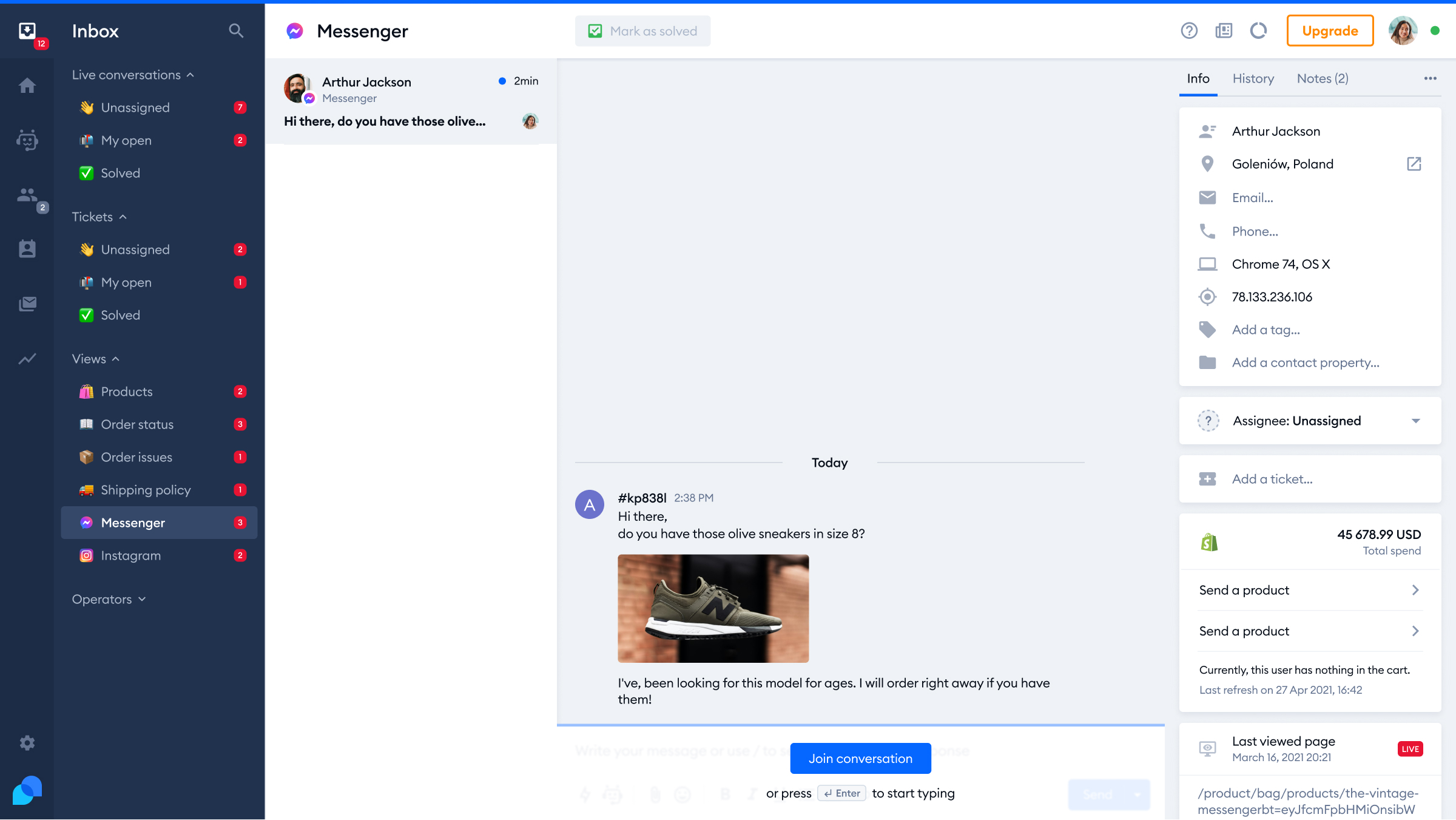
And how does it work?
Well—
Once you implement the ecommerce help desk software, it will turn your emails and customer messages into tickets. These will be organized based on your preset rules including priority, date, and channel. This way, your support team can handle requests more efficiently.
Now, what are some of the main benefits of an ecommerce help desk system you can look for?
Benefits of an ecommerce help desk
Thanks to a help desk, you can take care of common questions and repetitive tasks automatically, which will give your agents more time to handle more complex support requests. This can improve customer communication across many different channels, as well as client retention. What are some other advantages of this system?
Here are key benefits of a help desk system for ecommerce retailers:
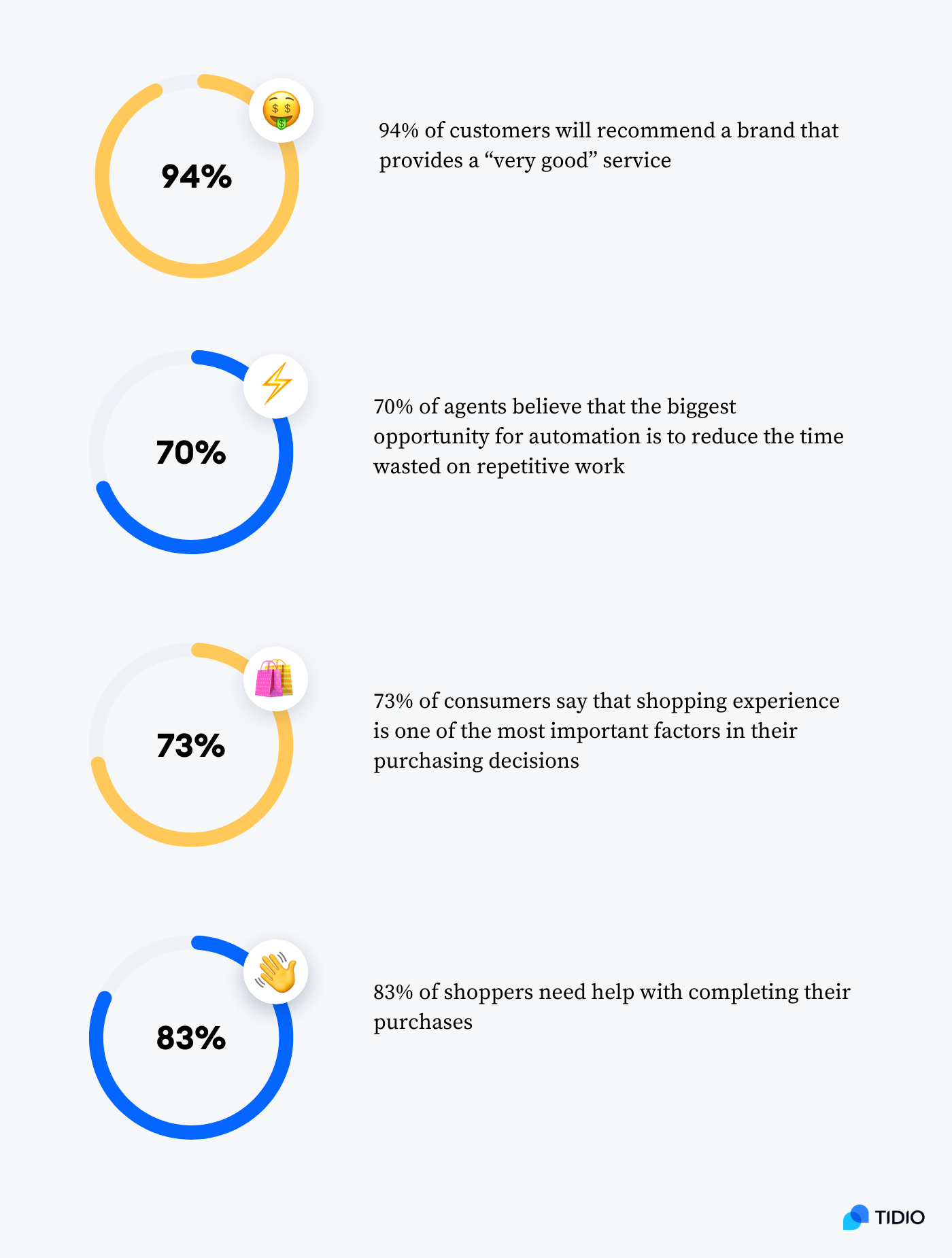
Improved customer satisfaction
A help desk provides customers with a direct channel to get their issues resolved quickly. This leads to higher customer satisfaction and improved communication. The system makes it easy to notify shoppers about ticket updates via their preferred channels. It will help to ensure clients are kept informed throughout the shopping as well as delivery progress.
And it pays off! About 94% of consumers will recommend a brand that provides a “very good” service. Make sure you delight your customers, and they’ll become your promoters in no time.
Faster resolution times
Help desk software allows tickets to be routed to the right agents and provides tools to facilitate communication. This results in faster response time and resolution of customer issues. Also, providing omnichannel support keeps all of the communication in one place to ensure no ticket gets omitted.
In fact, ecommerce companies that use a help desk system resolve tickets about 53% faster than those that don’t use it.
Increased productivity
Features like canned responses, knowledge bases, and ticket automation help agents resolve customer inquiries faster. And with mobile access, agents can manage tickets on the go. On top of that, help desk systems generate reports on metrics like ticket volume, resolution time, agent performance, etc. This data can be used to identify problem areas and training needs.
You might be surprised to find out that a whopping 70% of agents believe that the biggest opportunity for automation is to reduce the time wasted on repetitive work like answering FAQs.
Increased sales
Ecommerce help desk systems provide an avenue for upselling and cross-selling opportunities during client interactions, driving additional revenue. Through data analytics, help desk systems can identify patterns, trends, and consumer behavior insights, which can be harnessed to tailor marketing strategies and improve product offerings. Consequently, this leads to higher conversion rates, repeat purchases, and ultimately a significant increase in sales.
And a study done by PWC found that over 73% of all consumers say that shopping experience is one of the most important factors in their purchasing decisions.
Read more: Check out this case study to discover how ADT Security increased sales using Tidio.
Scalability
Cloud help desk tools make it easy to scale support as your online store grows. You can add new agents and support channels easily. Moreover, these systems can also enhance the security of your ecommerce store. The solutions provide enterprise-grade security, including data encryption, role-based access control, and integrations with SSO (single sign-on).
Keep in mind that more than 83% of shoppers need help with completing their purchases. So, it’s a great idea to reach out to them on your website using one of your ecommerce help desk features.
So—
Let’s look at those features, shall we?
Main features of an ecommerce help desk software
Handling the prioritization of tickets coming from different platforms and channels is difficult. But with the right help desk system, you can handle customer requests easier.
Here are some key features of help desk systems that are especially useful for ecommerce businesses:
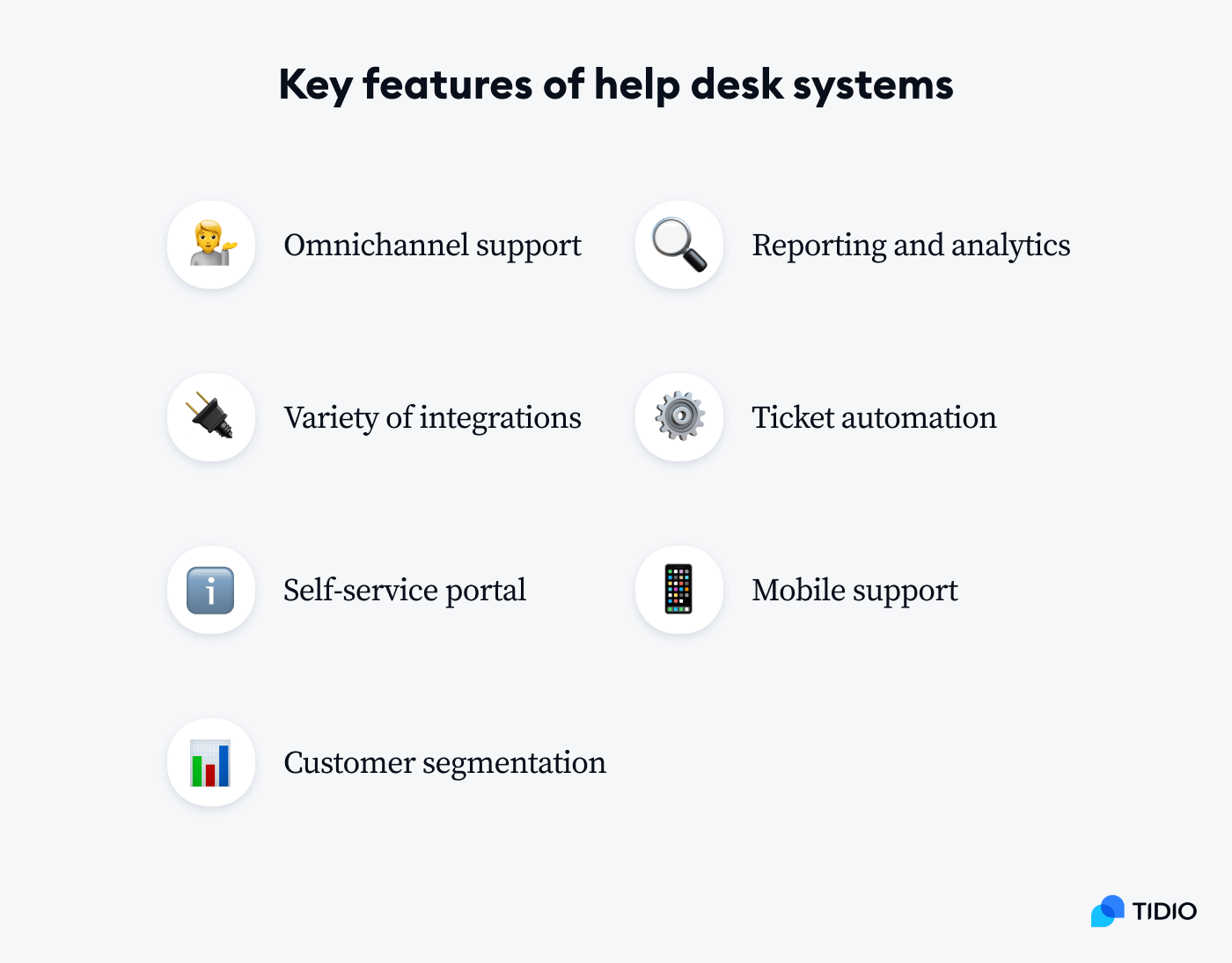
- Omnichannel support—support across email, phone, chat, social media and self-service portals to service customers on their preferred communication channels
- Variety of integrations—sync with ecommerce platforms like Shopify, Adobe Commerce (formerly Magento), Facebook Messenger, WhatsApp, and more to sync customer data into the help desk
- Self-service portal—a place where customers can find solutions, track order status, submit and view tickets without contacting support agents
- Customer segmentation—segment clients based on order history, lifetime value etc. to prioritize support appropriately
- Reporting and analytics—reports on customer satisfaction, agent performance, support ticket volumes and resolutions times, etc
- Ticket automation—auto-responses, triggers and ticket routing to streamline the handling of tickets
- Mobile support—mobile apps allow agents to work on tickets on the go and enable mobile self-service options
Since we know the benefits and top features, let’s dive into the best systems available on the market.
Best help desk software for ecommerce
With hundreds of customer service tools out there, it would take you days, if not weeks, to separate the wheat from the chaff. You need software that will store customer information, have an available live chat widget, offer templates, and more. We’ll show you our top picks for the job.
Here’s a quick comparison table of all of the top systems:
| Software | Rating | Free plan/trial | Best for |
|---|---|---|---|
| Tidio | 4.7/5 ⭐️ | ✅ | AI-powered chatbots in the package |
| HubSpot | 4.4/5 ⭐️ | ✅ | Unified customer service solution |
| Zendesk | 4.3/5 ⭐️ | Free trial | 1,000+ integrations |
| Freshdesk | 4.4/5 ⭐️ | ✅ | Ticket merging |
| eDesk | 3.8/5 ⭐️ | Free trial | Robust analytics dashboards |
| Zoho desk | 4.4/5 ⭐️ | ✅ | Variety of integrations |
| Help Scout | 4.4/5 ⭐️ | Free trial | Robust API |
| HappyFox | 4.5/5 ⭐️ | ❌ | Multiple ticket views |
| Salesforce | 4.3/5 ⭐️ | Free trial | Pipeline management |
| Gorgias | 4.6/5 ⭐️ | ❌ | Sentiment detection |
Let’s go through each of these ecommerce customer service software one by one in more detail.
1. Tidio
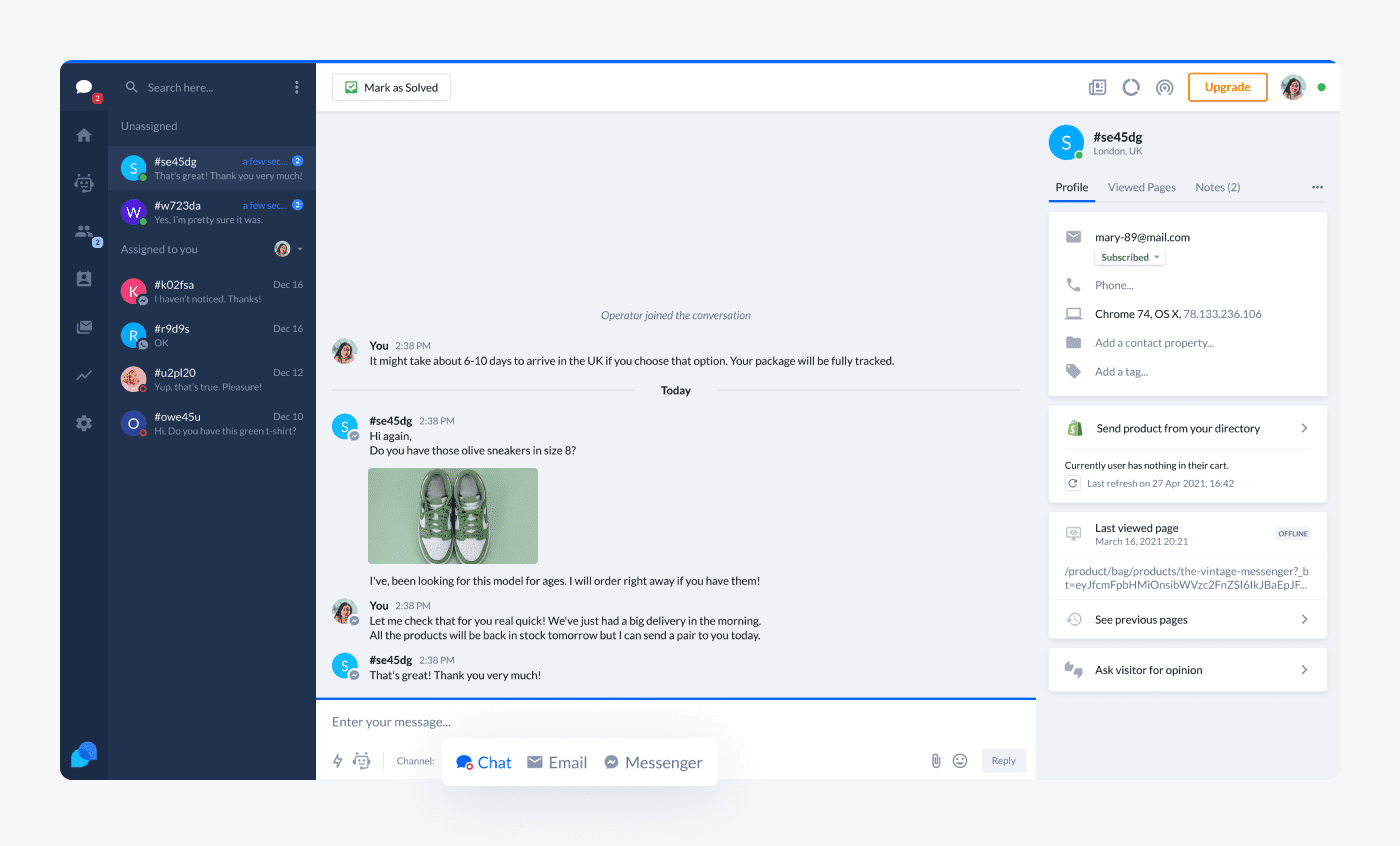
Ratings: 4.7/5 ⭐️ (1,410+ reviews)
Tidio is an ideal ecommerce help desk software that delivers robust capabilities to support online stores. It provides an intuitive dashboard with a unified inbox to manage customer queries across channels like email, live chat, social media, and more. Tidio gives ecommerce businesses the tools they need for optimized help desk operations in a single cost-effective platform.
Key features:
- Visitor segmentation
- Multichannel support
- AI and NLP chatbots
- Variety of notifications
- Built-in email marketing
- 7-day free trial available
- Free version available
- Starter ($29/mo)
- Growth (starts at $59/mo)
- Plus (starts at $749/mo)
- Premium (starts at $2999/mo)
Get an ecommerce help desk with all of the key features included
Read more: Learn all about Tidio’s one inbox, with its functionality and benefits.
2. Hubspot
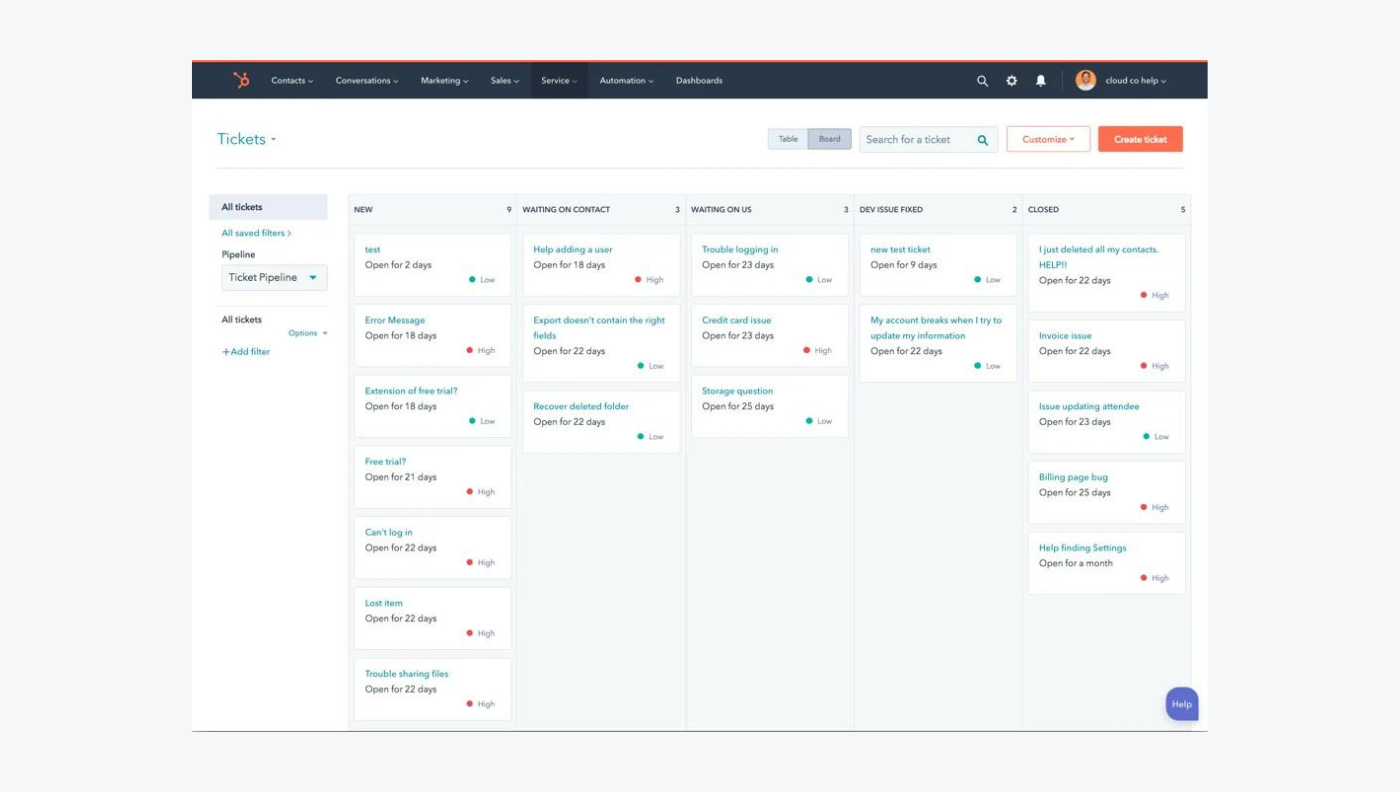
Ratings: 4.4/5 ⭐️ (2,160+ reviews)
HubSpot offers a unified ecommerce help desk solution alongside its CRM platform. It brings together a robust set of customer service capabilities tailored to ecommerce businesses. Moreover, key customer data from marketing and sales enriches client interactions. This tool helps online stores deliver personalized, context-aware customer support experiences.
Pros:
- Automated ticket routing
- Customer satisfaction tracking
- Real-time performance monitoring
Cons:
- Some users say it’s difficult to navigate between the message inbox and specific tickets
- Outdated email reply system
- Free plan available
- Starter (Starts at $30/mo)
- Professional (Starts at $490/mo)
- Enterprise (Starts at $1,180/mo)
Read more: Check out the key similarities and differences between CRM and ticketing system.
3. Zendesk
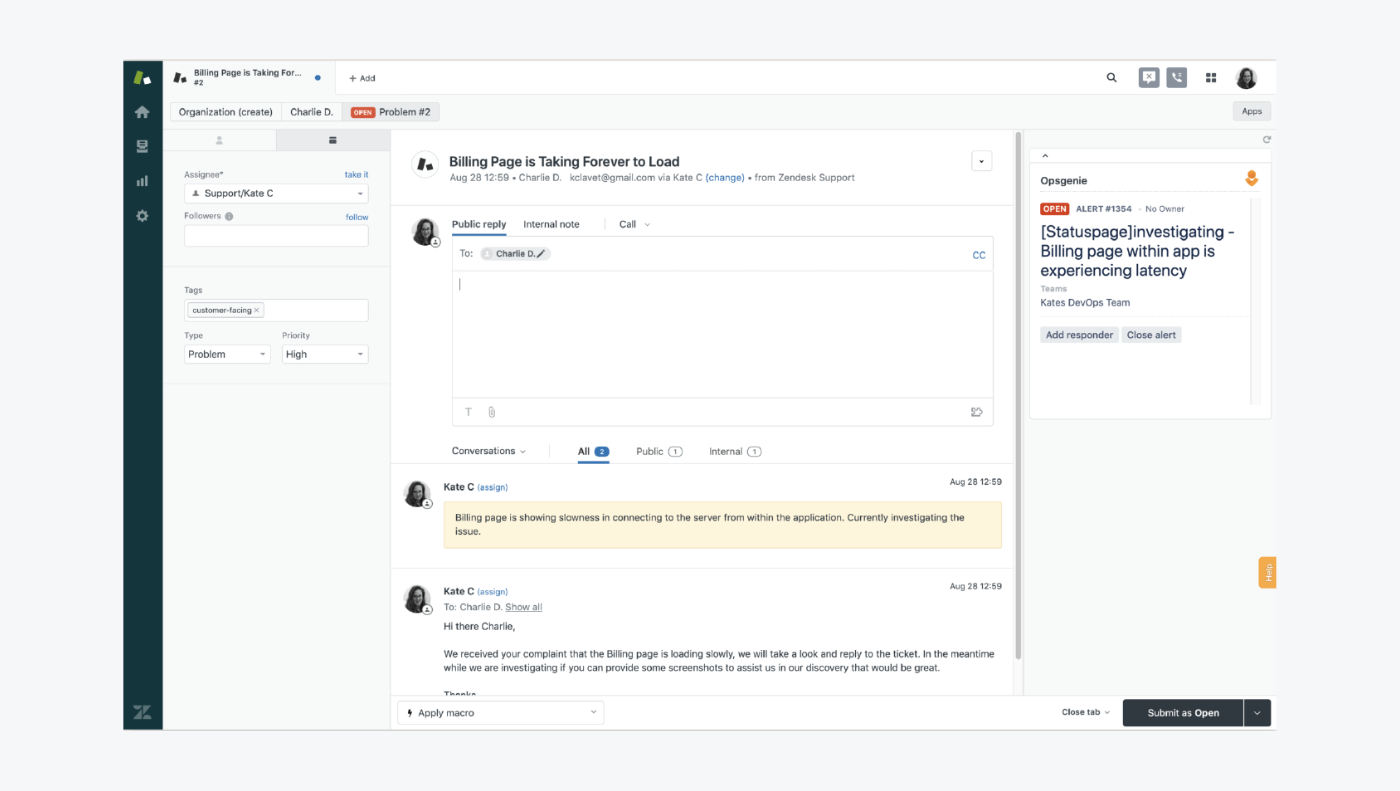
Ratings: 4.3/5 ⭐️ (5,790+ reviews)
Zendesk offers a robust help desk tailored to ecommerce companies managing high volumes of customer support interactions. It provides enterprise-level capabilities to optimize ecommerce customer service. With Zendesk, online stores can optimize customer support workflows, track performance through actionable reports, and scale help desk operations as needed.
Pros:
- Variety of deep integrations
- Multichannel support
- Self-service portal
Cons:
- The system is quite complex so it can be overwhelming
- Some users say there are too many email notifications
- 14-day free trial
- Suite Team ($69/mo/agent)
- Suite Growth ($115t/mo/agent)
- Suite Professional ($149/mo/agent)
- Suite Enterprise → contact sales team
Read more: Here are the main differences and similarities between Zendesk and HubSpot.
4. Freshdesk
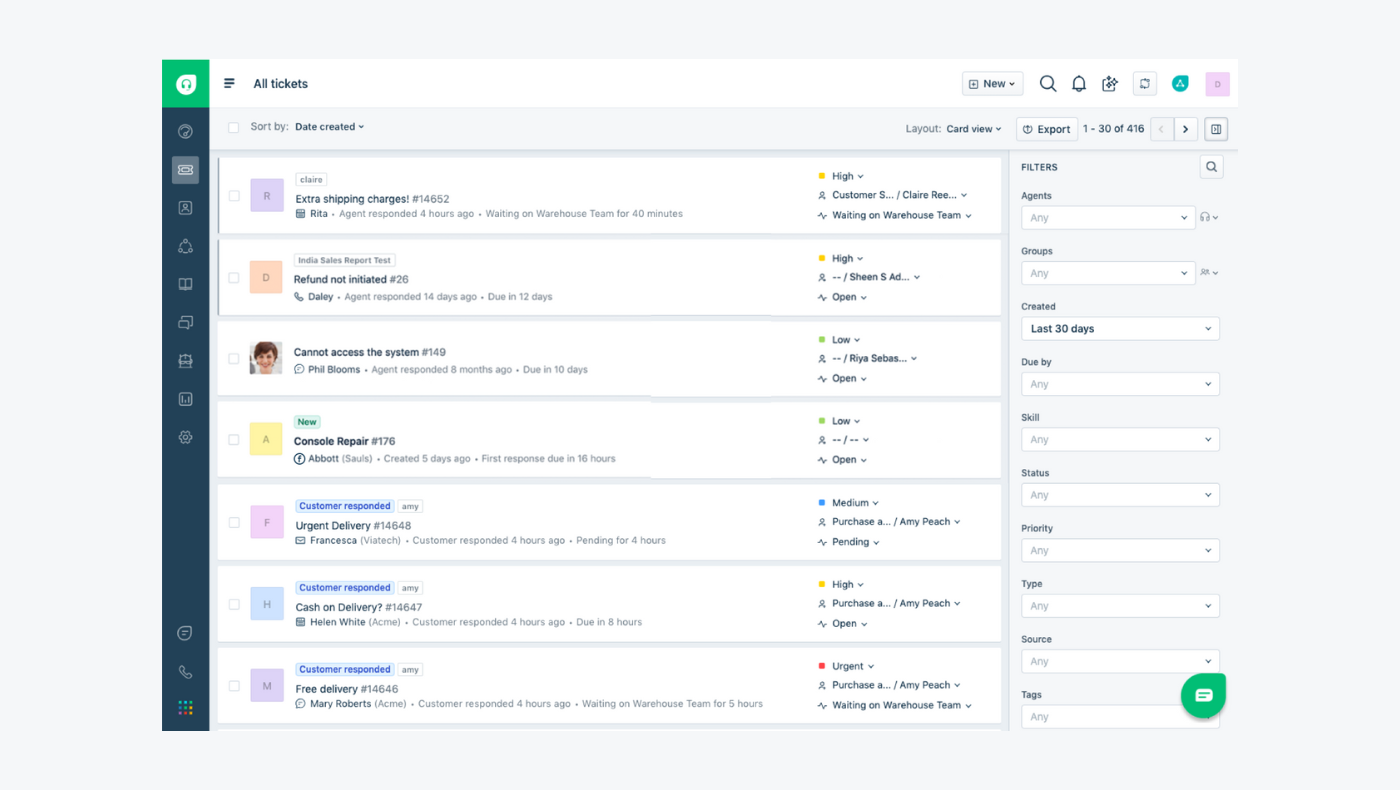
Ratings: 4.4/5 ⭐️ (3,070+ reviews)
Freshdesk provides an intuitive, easy-to-use help desk designed for ecommerce businesses. It includes key capabilities to streamline customer support and scale operations. This software makes it easy for online stores to manage client issues across channels in one place. Moreover, the intuitive interface helps agents resolve tickets quickly and optimize the support processes.
Pros:
- Ticket merging available
- Team collaboration
- iOS and Android apps
Cons:
- Difficult to reach the support team
- User interface is hard to navigate
- Free plan available
- Growth ($18/mo/agent)
- Pro ($59/mo/agent)
- Enterprise ($95/mo/agent)
5. eDesk
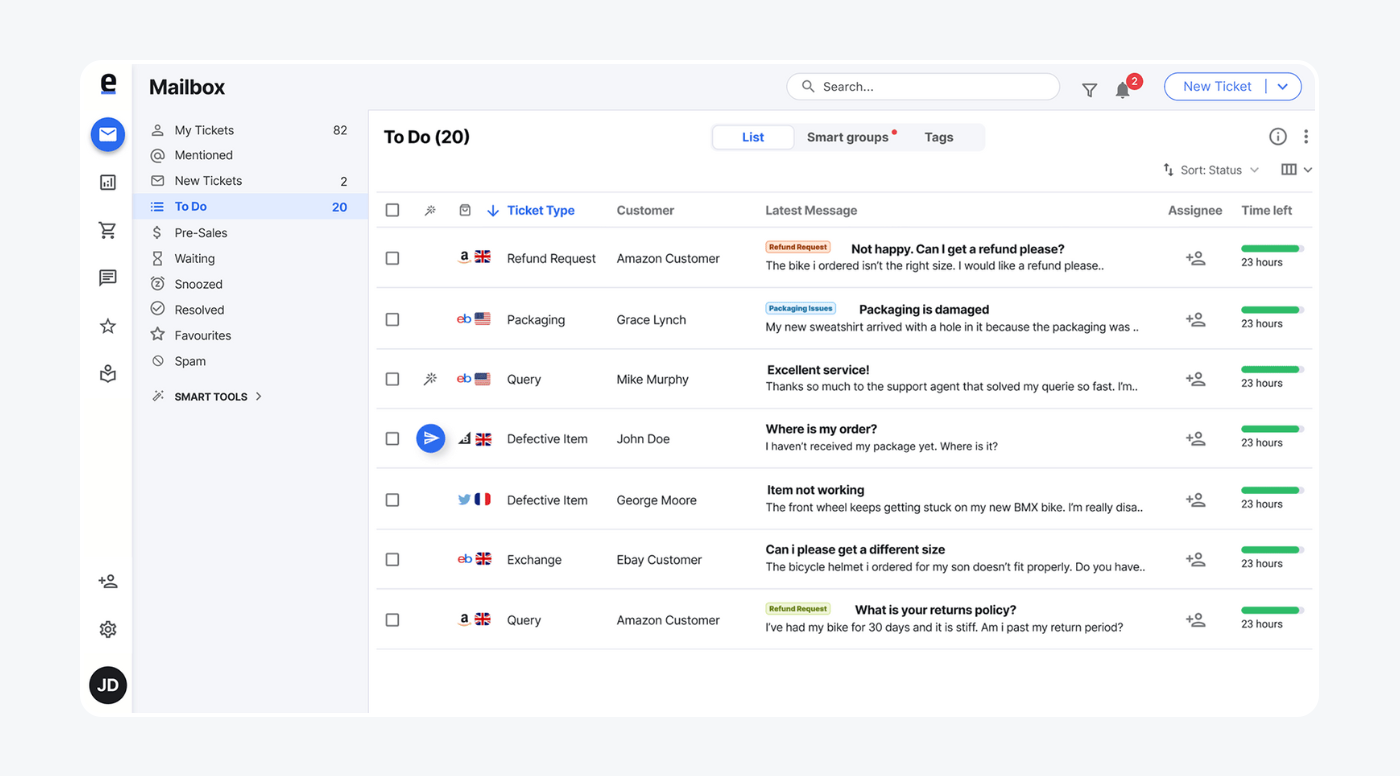
Ratings: 3.8/5 ⭐️ (15+ reviews)
eDesk is an intuitive, cloud-based customer service software designed specifically for online merchants. It enables support teams to efficiently manage customer queries and issues across multiple channels, including email, live chat, and social media.
This system empowers brands to deliver responsive, personalized support while maximizing agent productivity. It also offers a number of features that help high-growth online businesses optimize their customer service operations.
Pros:
- Automated workflows for ticket assignment and routing
- Robust analytics dashboards
- Branded customer self-service portal
Cons:
- Some users report frequent glitches in the system
- Customer support needs improvements
- 14-day free trial
- Team ($89/mo)
- Professional ($129/mo)
- Performance+ (starts at $189/mo)
- Enterprise → contact sales team
6. Zoho desk
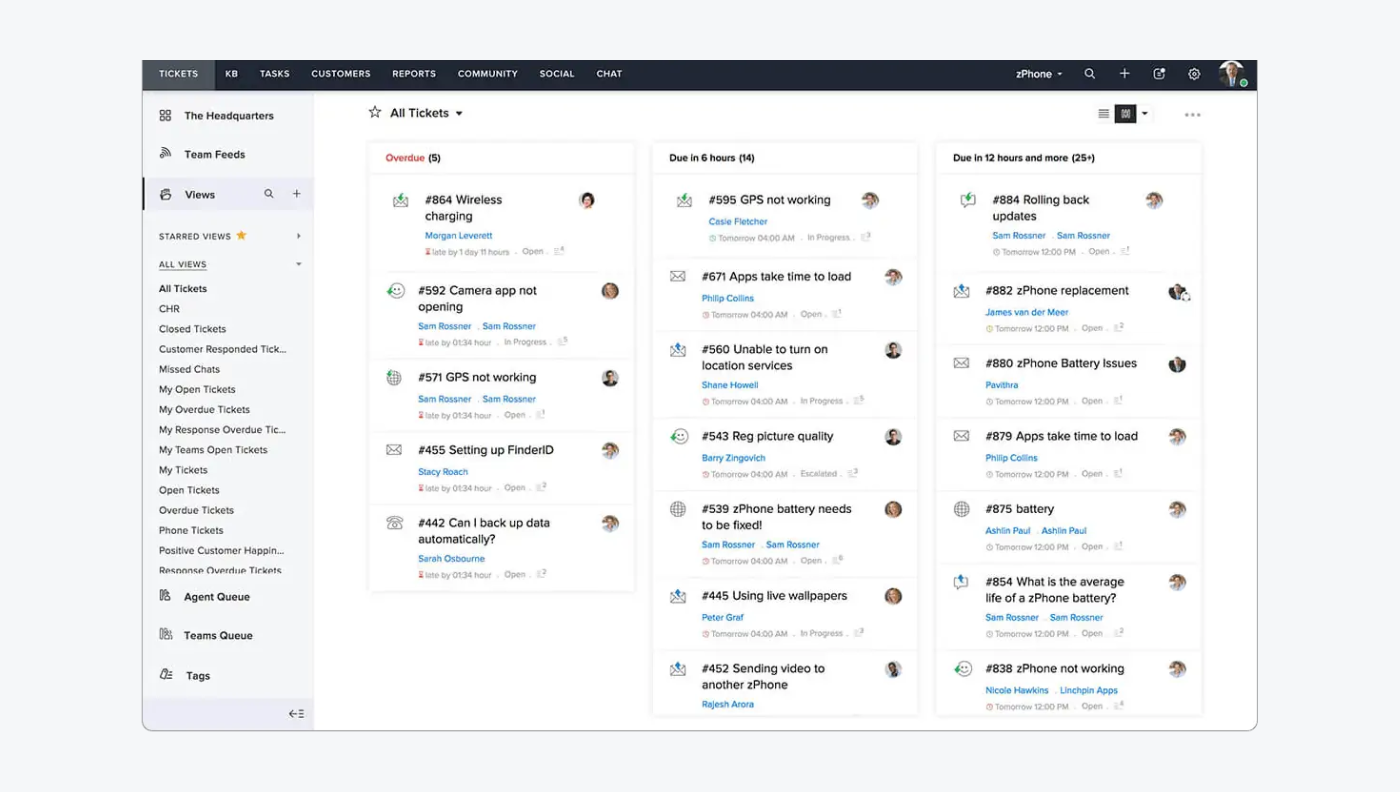
Ratings: 4.4/5 ⭐️ (5,190+ reviews)
Zoho Desk offers a unified help desk integrated into the Zoho CRM platform. This makes it easy for businesses to connect customer support using sales and marketing data. With this tool, ecommerce help desks get a unified view of customer interactions across departments which enables personalized, context-aware support.
Pros:
- Time tracking for ticket resolution
- Automated workflows available
- Variety of integrations like Jira, Slack, etc.
Cons:
- Email ticket notifications need improvement
- Reports are not very visual
- Free version available
- Standard ($20/mo/user)
- Professional ($35/mo/user)
- Enterprise ($50/mo/user)
Read more: Explore the best Zoho Desk alternatives on the market.
7. Help Scout
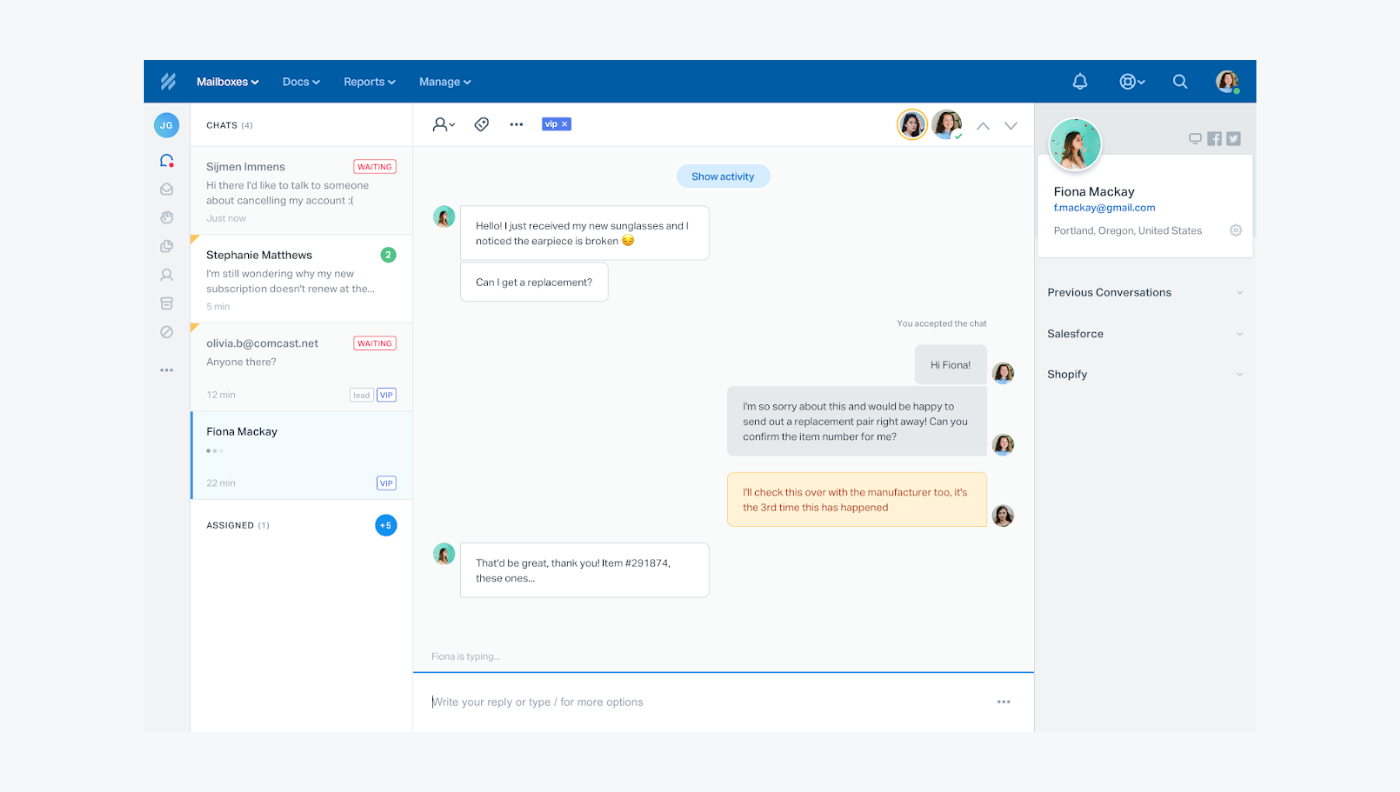
Ratings: 4.4/5 ⭐️ (400+ reviews)
Help Scout provides a robust, flexible help desk suitable for ecommerce businesses. It seamlessly integrates email, live chat, docs, and phone channels into one system. This customer support for ecommerce helps you provide omnichannel support and improve client experience with your brand. Moreover, you can tailor it to your specific business needs for better results.
Pros:
- Powerful bot APIs
- Knowledge base
- Segmented inboxes
Cons:
- Unreliable spam filter
- Marketing features are limited
- 15-day free trial
- Standard ($25/mo/user)
- Plus ($50/mo/user)
- Enterprise → contact sales team
8. HappyFox
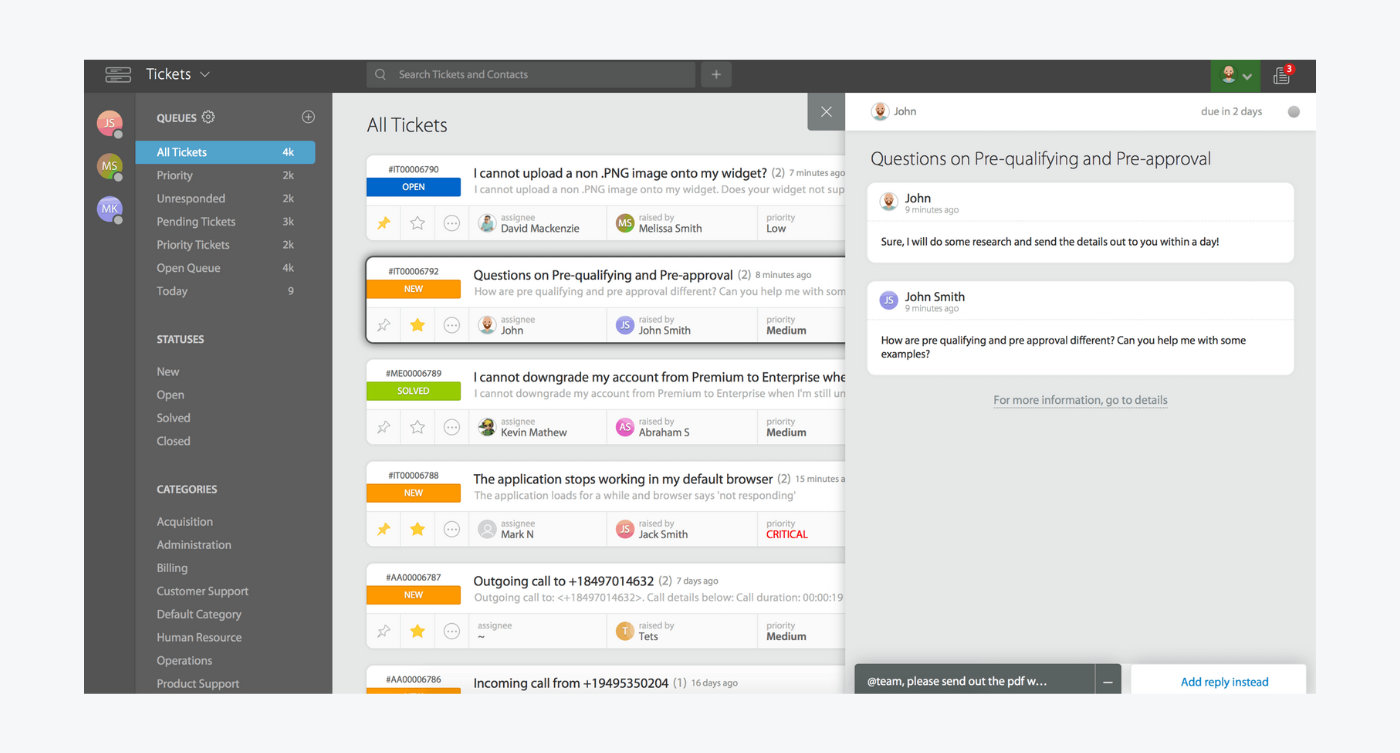
Ratings: 4.5/5 ⭐️ (120+ reviews)
HappyFox offers an intelligent help desk with functionality tailored to improving ecommerce customer support. It streamlines ticket management and provides actionable insights about your KPIs so you can have a better understanding of how your support team is performing. With this ecommerce help desk system, you can use automations and self-service features to optimize your support operations better.
Pros:
- Multiple ticket views
- Powerful reporting
- Variety of automations
Cons:
- Non-customizable inputs
- Limited onboarding material
- Mighty ($39/mo/agent)
- Fantastic ($59/mo/agent)
- Enterprise ($79/mo/agent)
- Enterprise Plus ($99/mo/agent)
9. Salesforce
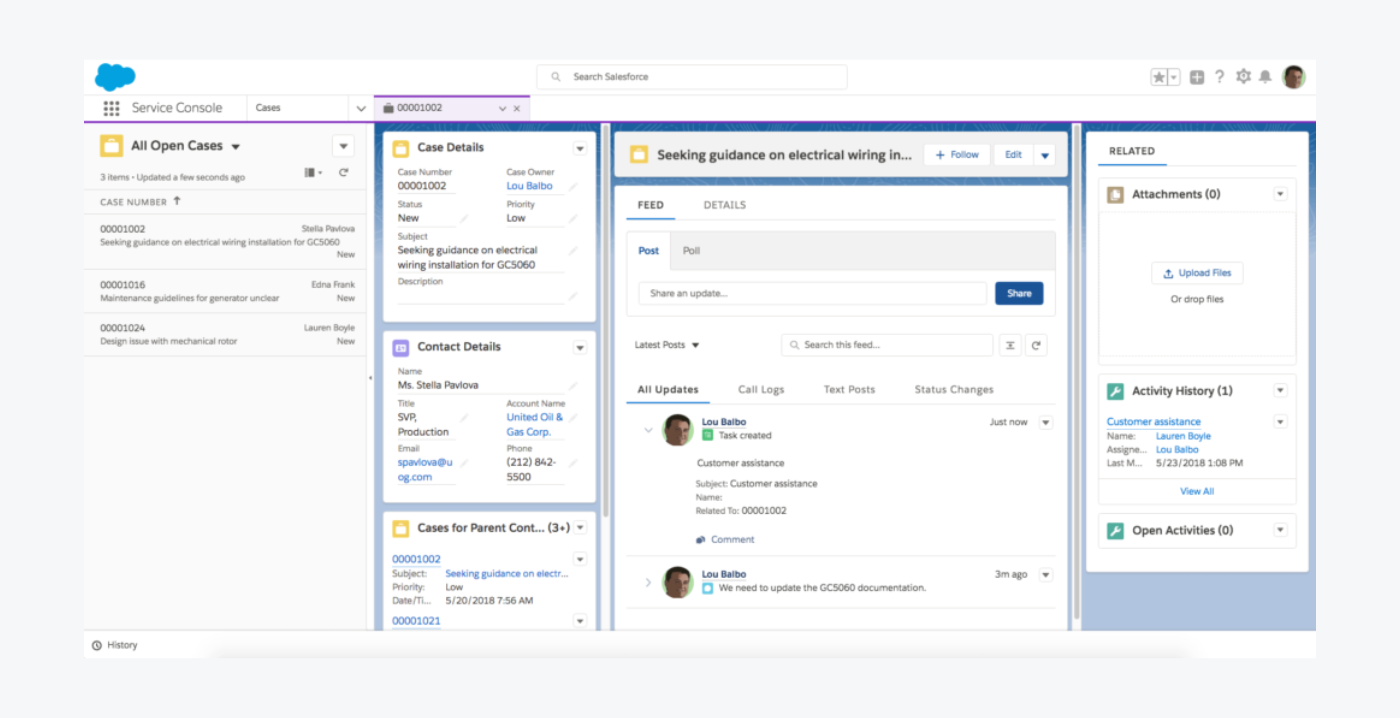
Ratings: 4.3/5 ⭐️ (3,650+ reviews)
Salesforce offers a powerful cloud-based CRM that doubles as a robust ecommerce help desk. It enables businesses to unify customer support with data from sales, marketing, and your online store. This software helps businesses get customer data visibility to deliver personalized, context-aware support. Moreover, it provides over 100 integrations with a variety of apps.
Pros:
- Contact management
- Lead capturing features
- Pipeline management
Cons:
- Limited flexibility on modifications of the omnichannel feature
- The UI needs improvements towards being more help desk-oriented
- 30-day free trial
- Starter Suite ($25/mo/user)
- Professional ($80/mo/user)
- Enterprise ($165/mo/user)
- Unlimited ($330/mo/user)
- Unlimited+ ($500/mo/user)
Read more: Learn all the differences and a detailed comparison of Zendesk vs. Salesforce to choose the right software for your business.
10. Gorgias
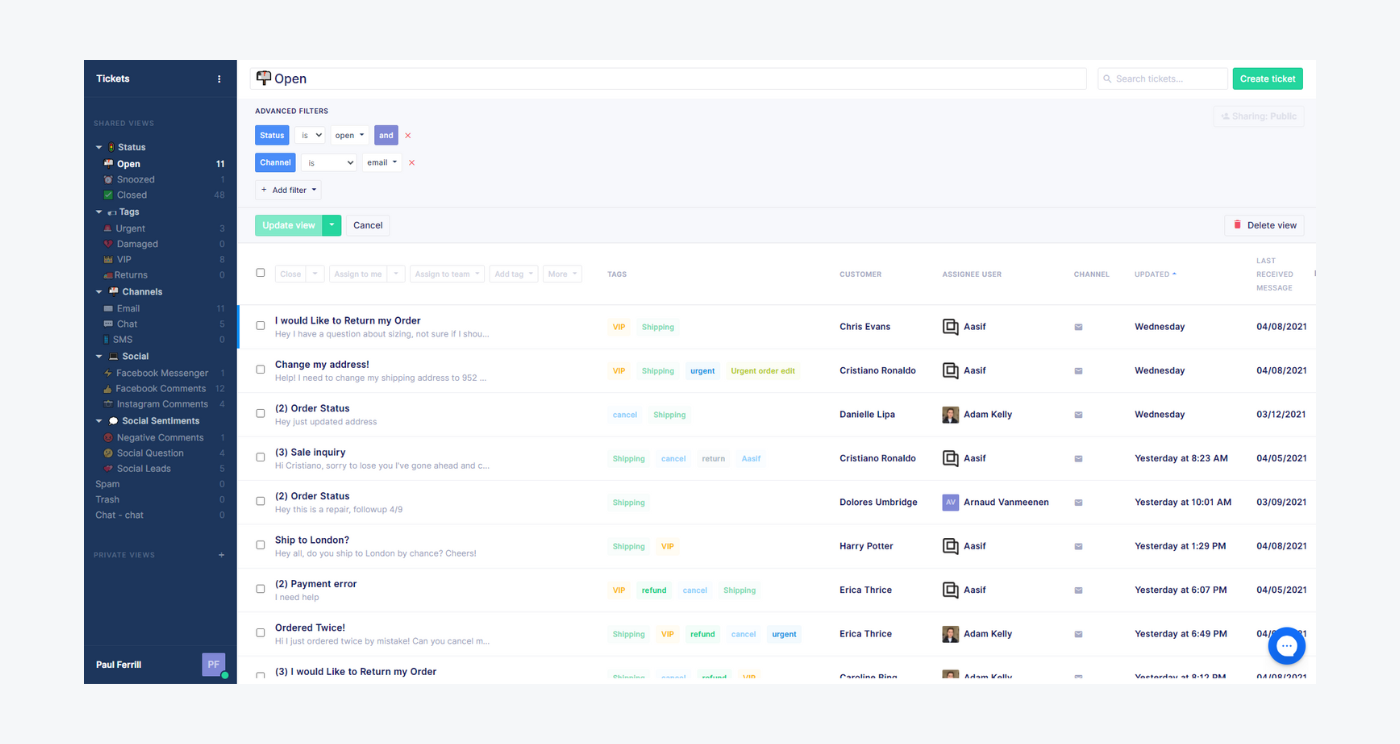
Ratings: 4.6/5 ⭐️ (400+ reviews)
Gorgias provides a help desk specifically built for ecommerce businesses. It includes capabilities tailored to addressing customer issues and converting queries into sales. These include pre-written responses, automations, and a number of reporting dashboards for the most efficient workflows of your customer service team members. This ecommerce help desk solution also provides onboarding training, so your agents can get up to speed quickly.
Pros:
- Sentiment detection
- Automated intent analysis
- Dedicated training resources
Cons:
- Some users report receiving spam emails
- The platform can be confusing and the training material can be a little overwhelming
- Starter ($10/mo)
- Basic ($60/mo)
- Pro ($360/mo)
- Advanced ($900/mo)
- Enterprise → contact sales team
Read more: Check out the best Gorgias alternatives available today.
But how do you know which platform is the best choice for your business?
Let’s have a look.
How to choose the best ecommerce help desk for your business?
Selecting an ecommerce help desk solution depends on your business needs and scale. The right software aligns with your support requirements and growth trajectory.
For small ecommerce businesses like solopreneurs, an affordable basic system like Freshdesk provides core features, including ticket management and mobile access. Robust enterprise help desk capabilities aren’t essential at this stage.
Growing mid-market ecommerce companies benefit most from automation, shared inboxes, and analytics in platforms like Tidio. The integrated ticketing, marketing, and AI bots match SMB needs.
Large and enterprise ecommerce organizations require robust, customizable solutions like Zendesk. Scale support seamlessly via dedicated success managers, deep integrations, and automation.
The optimal help desk for ecommerce empowers agents with knowledge bases, enables omnichannel experiences, and provides data-driven insights. This strengthens customer satisfaction and loyalty across business sizes. Carefully evaluate features and align software with your ecommerce support needs.
Ecommerce help desk: summary
Implementing an ecommerce help desk software aligns customer support capabilities with online store needs. This enables delivering exceptional client experiences and helps to grow your brand in the long run.
Ecommerce businesses should evaluate help desk solutions based on their specific requirements and size. Choosing the right help desk platform is a strategic investment that pays off through better customer satisfaction, increased sales, and higher lifetime value.
But the software is only one part of the equation. Ecommerce businesses also need to invest in customer service training and optimize processes to reap the full benefits. With the right help desk and strategy, exceptional support is attainable for ecommerce stores of all sizes.
Get the best ecommerce help desk software on the market

